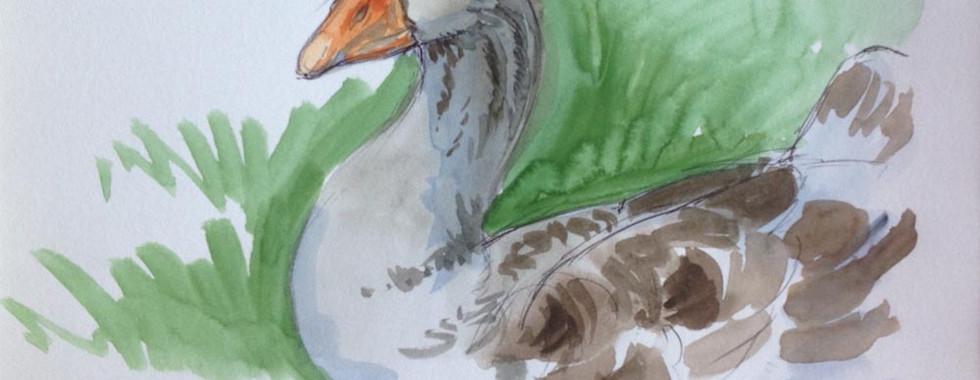Ethical & Sustainable Foie Gras: La Patería de Sousa Shows Us How Its Done
- Irene Llorente
- Mar 5, 2019
- 4 min read

A few years ago, my husband and I went to meet Eduardo Sousa, the first producer of natural Foie Gras, produced without forcing the animal to eat. This man has taught me to see life from another perspective: dignant and honest work does not consider money or production value as the main objective, but rather passion and respect is what makes a successful entrepreneur.
Dan Barber
It was in 2015 that we came across a TED talk where Dan Barber spoke about the future of food preparation and modern production methods. The international chef asserts that there is a direct relationship between the production method, the nutrients of the food and the taste: when a food has more flavor it also has more nutrients. Barber talks about how the Foie Gras of today is the result of forcing the animal to eat until the liver is swollen and sick. However, the origin has nothing to do with this disgraceful practice. Dan explains the natural origin of eating this type of liver. The Jewish people living in Egypt knew that the goose, like all animals, fattened itself before winter came to prepare for migration. It was this moment, when our ancestors sacrificed the animal, taking advantage of the naturally fattened animal in a natural way. When the Pharaoh discovered this delicacy, he demanded that the Jews reproduce this fatty liver throughout the year. From there comes the Hebrew term 'gavage', the term used to define the forced eating of an animal to fatten it.

Sousa’s Method
Eduardo Sousa does not force his animals to eat, but takes advantage of the richness of his land to provide food for the geese all year round. This method removes the need to migrate, so the geese don´t leave. It is not that the terrain is special, but that Sousa has created a perfect environment for the goose: every season, its land gives a different food that provides for all of the geese´s needs. Acorns, olives, lupins, figs, and different indigenous herbs make up their diet, providing an exquisite flavor to their meat. His Foie Gras has won the gold prize in France, supposed foie authorities. Later, after much scandal, they disqualified Sousa because they deemed his geese wild. Had Sousa caused his geese more suffering, therefore producing an inferior Foie Gras, perhaps they would accept his method.

Extremadura
We decided to send a message to Eduardo to ask if we can visit his farm, to which he agreed. It is located in the south of Extremadura, Badajoz, in a typical Extremadura ecosystem: hills and mountains with oaks dotted throughout the landscape. This is an area famously rich in resources and with a climate where green extends all over the horizon. Eduardo's land is so rich in fruit trees and edible herbs that it is clear why his geese do not leave the land: they have everything they need all year round on Eduardo's farm.

The Experience
Visiting Sousa was a unique and revealing experience. Especially when you are surrounded by a flock of wild geese, able to fly, and you have to be quiet and still so as not to scare them away. After the initial excitement, we began to soak in the scene we were witnessing. The geese fed on all kinds of things, from the green and leafy grass that covered the dehesa. The flock moved as if it were a single organism, passing through acorns, insects, seasonal fruits, etc. During the time they fed, they walked, defecated and rested in a continuous cycle. While all around them, life bustled with insects, mammals and other creatures in balance around the life of the goose. Eduardo's secret is his understanding of the natural processes that the geese follow in the ecosystem, in such a way that it is not necessary to force the animal or its environment to enjoy the expression of that animal; respecting the natural process of life. We had the opportunity to spend those two days soaking up the rhythm of the life of the goose.

The Food
Part of the experience was eating with Eduardo and his family. We ate one of the best stews I have ever tasted. Spanish Cocido is a meat stew with beef, pork, chicken, garbanzos, and vegetables. But in this case, instead of chicken, it was goose. You can not describe the quality of its flavor, only that you have an inexplicable satisfaction after you finish eating. It's as if the life that animal had lived now is part of mine.
The example that Eduardo Sousa transmits is that only when we pay attention and give respect to the processes that already exist in nature, do we reach a product with a higher level. We are to collaborate with nature instead of controlling every detail of it, understanding its cycles and needs. I think that this vision is what will bring us balance in the future of cannabis.
It isn’t necessary to force an organism - whether with nutrients, chemicals, or antibiotics - to grow faster, all along using the excuse of demand and that the result is a superior product. The reality is that a quality product is one that is manipulated less, not more.
This is the fight that we find every day in the cannabis industry, just like all the industries of our society. Now is the time to take the point of view of mutual growth, not to make money or satisfy our ego. We want a natural product. Grow up marijuana growers.















Comments